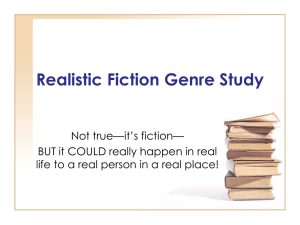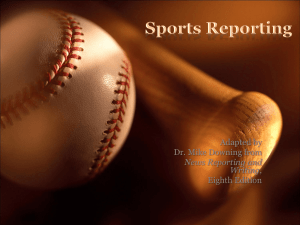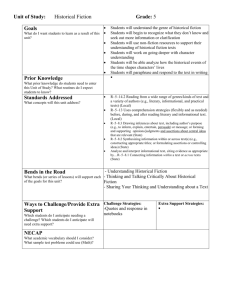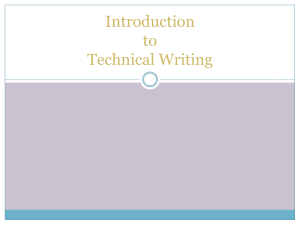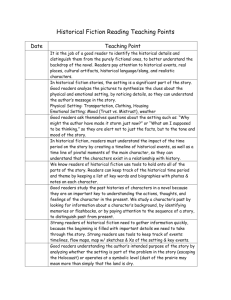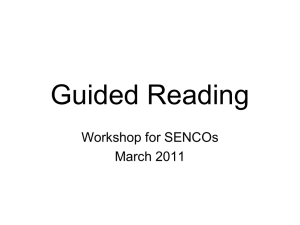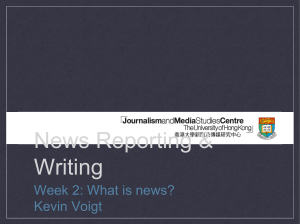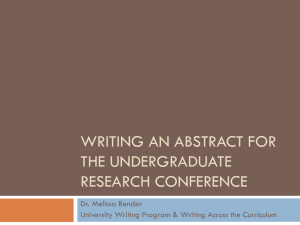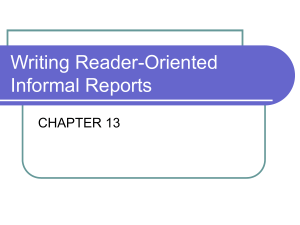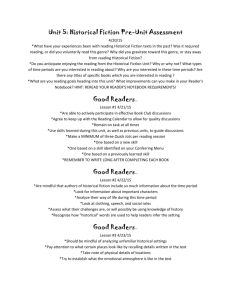Children`s Literature - essential reading!
advertisement
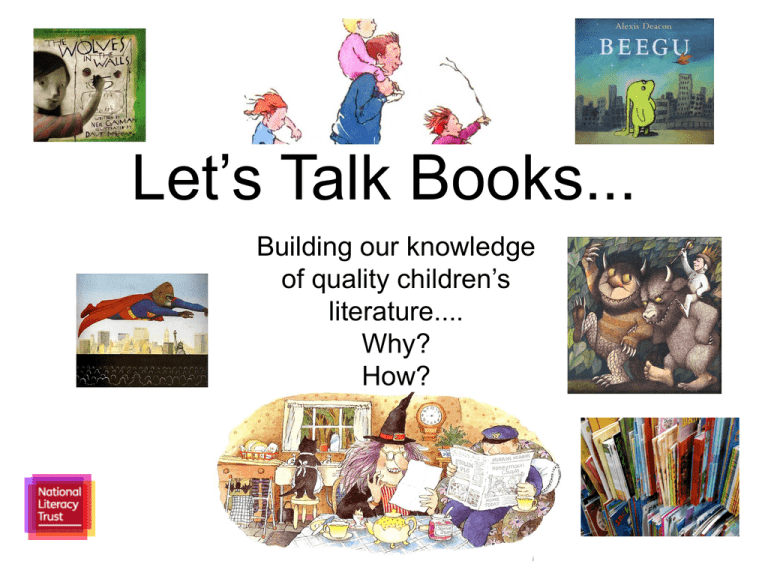
Let’s Talk Books... Building our knowledge of quality children’s literature.... Why? How? • Let’s talk books... • How did you choose your 3 favourites? • Why is each special to you? • Who do you remember talking about and sharing books with as a child? 2 Where are we now? • A few questions to ponder: • Who was the last person to share a children’s • • • book recommendation with you? When did you last share a children’s title which was new to you? How would you rate your knowledge of Children’s literature? Fiction? Non fiction? Poetry ? 3 Why create a community of readers among staff? 4 Teachers as Readers • “..being a reader frames us as reading teachers and supports us as we seek to apprentice younger readers, model our own love of reading and create communities of readers within and beyond school.” • Reading Teachers/Teaching Readers. Why teachers who read make good teachers of reading. Cremin. T, UKLA 2011 Surely it is this passionate adventure with language we want for all our children before all else. We therefore help them explore literature as its own story, and the story of literature is discovered in the story of our own and others’ reading of it. Tell Me. Children , Reading & Talk. Chambers. A 6 Teachers as Readers - what the research says... • Here’s the bad news… • UKLA’s Phase 1 (2008) survey of 1200 teachers showed that only 6.5 % had recently read any children’s fiction • Their knowledge of children’s literature reflected a considerable cause for concern • The indications are that teachers relied heavily on well known, ‘celebrity’ authors and lacked the knowledge of a significantly diverse range of texts to encourage reading development and make informed recommendations. (UKLA, 2008) • Evidence shows that few young people perceive that their teachers help them choose books. (Maynard et al 2007) • How do we compare as a staff? 7 The good news... • “An enhanced awareness and deep pleasure in reading can, this UKLA study suggests, nurture young readers who, like their teachers, are engaged, self motivated and socially interactive readers. Whatever phase we teach - the choice is ours.” Cremin,T. (2011) 8 So, what are the barriers? 9 What are inspectors looking for? • “One of the key aspects of effective reading in primary schools is the determination of staff to promote a culture which encourages pupils to enjoy reading, share their views on what they have read and develop the ability to compare texts and express opinions about them.” Reading, writing and communication. Ofsted Guidance, Oct 2011 So, if time is an issue... 10 • “Although schools especially primary schools, devoted a considerable amount of time to reading, few had a coherent and consistently articulated policy.” • Reading ,writing and communication. Ofsted Guidance, Oct 2011 11 What can we do to help us develop our knowledge and passion for children’s literature? 12 Key issues to consider: • Book selection - what is the current quality of our book stock in school (narrative, picture books, non-fiction, poetry)? • Do we have a secret bookworm amongst us? Our own Richard & Judy in our school family (teacher, TA, governor, parent, grandparent, administrator)? If yes, how do we use that person effectively to help us develop as a community of readers? • Time - often the biggest barrier. This needs to be written into our approach to reading across the whole school to enable staff development. • Resources - where do we go for up to date knowledge and recommendations? 13 We are the linchpin...enabling great Booktalk SELECTION (Bookstock, availability, accessibility, presentation) READING (Time to read ENABLING ADULT RESPONSE “I want to enjoy it again” Hearing it done Formal Talk Doing it for yourself) Book Gossip Taken from: Tell Me. Children, Reading & Talk Chambers, A 14 Where to start... • Share your personal preferences • ‘Core’ texts? • Quality of language • Books to make you laugh, make you cry... • Books for specific themes and purposes 15 Teachers as readers... quality is key • • • • • www.booktrustchildrensbooks.org.uk www.clpe.co.uk – The Core Book List www.lovereading4kids.co.uk www.booksforkeeps.co.uk Choosing and Using Fiction & Non Fiction in the classroom 3-11. Margaret Mallett (Fulton) • Teach Primary / Teach Secondary magazines • National Literacy Trust book lists 16 Teachers as readers... quality is key • Keep your eyes on the latest book awards: • Blue Peter Book Awards • CILIP Carnegie Medal • CILIP Kate Greenaway Medal • English 4-11 Book awards • Guardian Children's Fiction Prize • Nottingham Children's Book Award • Red House Children's Book Award • Waterstone's Children's Book Prize 17 Teachers as readers... quality is key • Bookmark the best children’s book blogs. • Here’s a great list for starters…visit the Federation of Children’s Book Groups who have an excellent selection at www.fcbg.org.uk/book-blogs • Don’t forget to share any you find...or start your own school blog! 18 What about your own staff book group? • Explore your own literacy. • Share quality literature with colleagues. • Model lifelong reading for pleasure. • Gain experience and confidence with book discussion. • Reflect upon and learn from personal experience with books. • Enhance teaching and learning. • Why not choose a mixture of adult and young people’s literature? 19 Here are a few enticing titles to start you off.... • The Child that Books Built. Francis Spufford beware, you may cry... • STOP What You Are Doing And Read This - a collection of 10 essays from leading authors, from Zadie Smith to Mark Haddon, on why to bother with reading. 20 Don’t forget... • A problem shared…take a collaborative approach, use each other’s strengths • Have a central storage space (blog, web page, server area) to help build collections, recommendations and lists • If we are convinced this is a priority we must create time, backed up by permission/policy/release time for our bookworms to help us develop knowledge and quality... • Our environment should reflect our passion on doors, email signatures, displays: “Mrs Clark is reading......” 21 So... •…action stations! 22 National Literacy Trust • One in six people in the UK struggle to read, write and communicate • We believe that society will only be fair when everyone can communicate as well as they need • We deliver projects, campaign, investigate and innovate, share knowledge and work in partnership to transform lives through literacy • We are an independent charity www.literacytrust.org.uk 23

